2022 Summit Honorees
Below you will find the list of 2022 Summit Honorees and their biography.
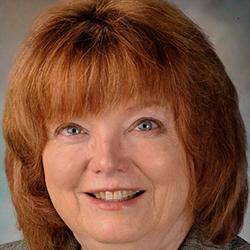
Karine Crow, RN, PhD, FAAN
Dr. Karine Crow is of Cherokee descent and received her bachelors of science from Texas Woman’s University and her doctorate in nursing from the University of Utah.
She was the Director of International Programs and holder of the Roger L. & Laura D. Zeller Professorship in Nursing at the University of Texas San Antonio. Previous leadership positions included Chair of the Nursing at Oglala Lakota College in Pine Ridge, South Dakota (an Associate Degree nursing program based in a tribal community college on the Pine Ridge reservation) and Coordinator of Northern Arizona’s School of Nursing American Indian Program (the first baccalaureate nursing program on a reservation in the United States for eleven years.
Dr. Crow’s research has focused on gathering information from multiple archival sources to gain perspectives regarding contributing factors to the underrepresentation of American Indians in nursing. The review begins in the late 1800s by identifying educational assimilation efforts, the role of field nurses and field matrons in introducing Western healthcare to American Indians, followed by examples of American Indian nursing programs and early American Indian nurses and their contributions, and concludes with information about current American Indian nursing programs and recruitment efforts.
Dr. Crow’s development of a culturally congruent curricula for nurses in higher education addressed health disparities and health equity among American Indian and Indigenous populations. Programs using this framework included teaching American Indians, Cambodians, Russians, Chinese, and refugee/ immigrant students. The success of the nursing curricula and consultations with professionals from the U.S., Australia, Canada, China, Czechoslovakia, India, Lithuania, the Netherlands, and South Africa enhanced diverse educators’ delivery of nursing education and supportive services to diverse populations worldwide.
Results of a more culturally congruent stable workforce was evidenced when graduates remained within their community, leadership appointments increased as well as development of more inclusive culturally congruent hospital policies, nursing interventions (framing them appropriately for language, imaging, and health beliefs), and standards of care.
She has received recognition from the American Nurses Association Alumni Minority Fellowship; the Robert Woods Johnson Foundation; and the Alaskan Elders for Excellence in Cultural attunement and lifelong learning for her accomplishments as a leader in American Indian Education.
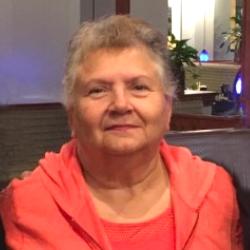
Barbara Dahlen, PhD, RN
Dr. Barbara Dahlen was an enrolled member of the Turtle Mountain Band of Chippewa Indians located in Belcourt, ND. She had a wealth of knowledge on Plains Indians culture and traditions and was a Professor at Minnesota State University, Mankato, School of Nursing. Dr. Dahlen departed this world on earth on May 7, 2021. She is survived by her 4 children and 8 grandchildren. Her husband of 45 years, David, departed in September 2020.
Dr. Dahlen graduated from the University of North Dakota (UND) with Bachelor’s and Master’s degrees in Nursing. She also completed the Family Nurse Practitioner certification program at UND. Dr. Dahlen earned her PhD in Nursing in 2010 from the Christine E. Lynn College of Nursing at Florida Atlantic University. Her dissertation was entitled “Giving Voice to Historical Trauma through Storytelling: The Impact of Boarding School Experience on American Indians”.
Dr. Dahlen presented numerous times on the recruitment and retention of minorities in nursing and is considered a national expert. She was invited to testify on several occasions before congressional committees on Native American issues. She developed and designed the “Dream Catcher/Medicine Wheel Model” which helped to guide the development of the recruitment and retention of American Indians into Nursing (RAIN) Program at the University of North Dakota. The program has been an innovation for the nation and had a 92% and above retention and graduation rate during the years she was with the program (1990-2002). She served as a consultant to other universities concerning the recruitment and retention of minority nursing students. Her research on retention was based on the assumption that if a nursing student hope is nourished they will succeed. She received first place for American Nurses Association’s (ANA) 2002 Research Practice Award for the nursing research study, “Problems and Resources of American Indian Elders.”
Dr. Dahlen was a recipient of the BUSH Fellowship. She served as a grant reviewer and panel member for the US Health Resources & Services Administration (HRSA) for the advanced nursing education, cultural diversity, and comprehensive geriatric grant reviews. She was a member of Sigma Theta Tau International Nursing Honor Society, the American Nurses Association, the North Dakota Nurses Association, and the National Alaskan Native American Indian Nurses Association (NANAIA).
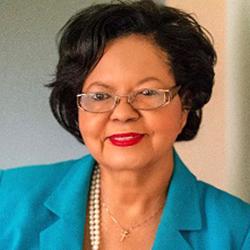
Karethy (Kay) Edwards, DrPH, APRN, FNP-BC, FAAN
Dr. Karethy Edwards is a Choctaw Native American descendant and the associate dean for academic programs at Florida Atlantic University (FAU) and CEO of the FAU Northwest Community Health Alliance Community Health Center, a Federally qualified Health Center Look Alike. Dr. Edward’s clinical practice, teaching, service and research has been directed towards decreasing health disparities and promoting health equity for culturally and ethnically diverse populations particularly African American and Native Americans in Oklahoma. She is one of the founding members and past president of the Association of Black Nursing Faculty, and past member of the National Alaska Native American Indian Nurses Association, member of the inaugural class of the Health Research & Educational Trust of the American Hospital Association’s Cultural Competency Leadership Fellowship, a W.K. Kellogg Inter-professional fellow and fellow of the American Academy of Nursing. As the CEO of the Florida Atlantic University/Northwest Community Health Alliance Community Health Center, children, families, adults, and elderly persons with low-incomes and homeless persons receive caring-base culturally aligned integrated primary and behavioral health care.
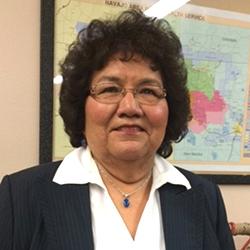
Ursula Knoki-Wilsone, CNM, MSN, MPH
Ursula Knoki-Wilson is a Diné (Navajo) nurse leader She serves as Community Relations Liaison Officer for the Office of the Chief Executive Officer (CEO) at Chinle Service Unit, NAIHS, Chinle, AZ. She has also served as Chief of Nurse Midwifery Service within the Department of Obstetrics and Gynecology at Chinle Comprehensive Health Care Facility from March 1996 to March 2013. From 2000 to 2013, she served as the Indian Health Service (HIS) Chief Clinical Consultant for Advance Practice Nurse. Her research interests are mentorship in nursing, cultural competency, maternal-child health issues impacting American Indians/Alaskan Natives, public health policies impacting the health of American Indians/Alaskan Natives and workforce development for rural American Indian communities. She is the founding and current President of N-NURSE (Navajoland Nurses United for Research, Service, and Education) incorporated in 2005 as a nonprofit following nine years of collaboration with the University of New Mexico College of Nursing to affect nursing within the Navajo Nation. N-NURSE works to integrate a Diné worldview into nursing curriculum and continuing education and is dedicated to nurturing a network of nurses who serve the Diné. Its Mentorship Project brings Diné nursing students together with N-NURSE mentors. With the leadership of N-NURSE President, Ursula Knoki-Wilson, the organization has conducted research and community assessments to promote health and wellness within the Navajo Nation. N-NURSE organizes and hosts nursing education symposiums where nursing students and licensed nurses learn how to provide culturally safe care.
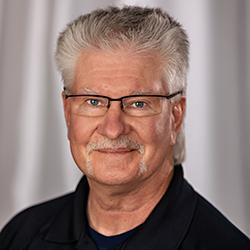
Gary Lawrence, PhD, RN, NRP
Dr. Gary Lawrence is a Registered Nurse and Paramedic with 15 years of pre-hospital experience and 30 years of hospital experience. He is employed by the Choctaw Nation Health Services Authority as the Director of Nursing Services. Lawrence instructs numerous credential courses and has 19 years’ experience as a healthcare educator in both the EMS and Nursing fields. Gary is also a Black Belt in LEAN Six Sigma. He also served his community for 27 years as a Volunteer Firefighter with 5 years as Assistant Chief and 6 years as Chief.
Gary graduated from Carl Albert State College in Poteau Ok. in 2001 with an A.A.S. in Nursing and in 2002 received an A.S. in Allied Health, & an A.A. in Psychology/Sociology. He received his Bachelor’s degree in Nursing Science at Northeastern State University in 2004 graduating Magna Cum Laude, and he completed his Graduate Program at the University Of Oklahoma College Of Nursing with a Master’s in Nursing Education in 2006 and a Doctorate in Nursing in 2012 receiving the Outstanding Doctoral Student Award.
Lawrence has conducted and presented his research at many local, state and national conferences on a variety of topics including recruitment and retention strategies and health risks/disparities in Native American populations including his dissertation work “The Relationship Between Historical Trauma and Cultural Buffers in Choctaw Native American Indians With and Without Diagnosed Depression and Alcohol Abuse”.
Gary is a proud member of the Choctaw Nation of Oklahoma, a member of the American Nurses Association (ANA), Oklahoma Nurses Association (ONA), The Emergency Nurses Association, Sigma Theta Tau International, and is an Alumni Scholar of the American Nurses Association (ANA) Substance Abuse and Mental Health Service Administration (SAMHSA) Minority Fellowship Program (MFP).
He and his wife Louisa reside in Talihina, Oklahoma and have 3 children and 8 grandchildren.
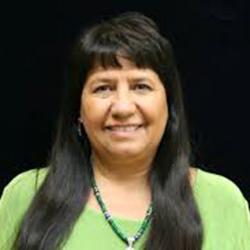
Beverly Patchell, PhD, RN, CNS, PMH-BC
Dr. Beverly Patchell is an enrolled member of the Cherokee Nation of Oklahoma, born and raised in the area of the Cherokee Nation capital of Tahlequah, OK. Her family survived the Trail of Tears, Oklahoma settlement and land allotment, boarding schools and the termination policies of the United States government and the State of Oklahoma. She has been reared in the traditional ways of Cherokee storytelling, ceremonies, and medicine. Through her work with tribes from across the continental United States, Alaska, and Hawaii, she has learned the ways of many tribal traditions from these diverse groups. In the mainstream culture, Dr. Patchell received her Bachelor’s and Master’s of Science in Nursing from the University of Oklahoma. She received her PhD from the New Mexico State University School of Nursing with a focus on Health Disparities and Border Issues with vulnerable populations. She has been a Clinical Nurse Specialist in Psychiatric/Mental Health nursing for 20 years and has certifications in the Psychiatric and Mental Health care of Children and Adolescents and in Nursing Administration, through the American Nurses Credentialing Center. She retired as faculty from the University of Oklahoma in 2013 from OU and in 2018 from the University of Utah in 2018. Dr. Patchell is a Past President of the National Alaska Native American Indian Nurses Association (NANAINA). Her research has focused on how the confluence of cultural history, education, and belief systems interact and effect identity formation in American Indian children and youth and influence on illness and disease.
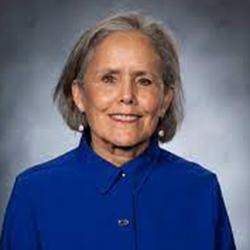
Judy Goforth Parker, PhD, APRN, FACHE
Dr. Judy Goforth Parker is an enrolled tribal member of the Chickasaw Nation. She is the Commissioner of Healthy Policy for the Chickasaw Nation. She assumed this position in July 2018. She previously served as the Secretary of the Chickasaw Nation Department of Health (CNDH) from 2009-2018. She has many years of experience working to increase quality of health care for Native Americans throughout the United States. She has a PhD in nursing from Texas Women’s University and has completed her Nurse Practitioner degree at the University of Oklahoma Health Sciences Center (OUHSC). Dr. Parker completed post-doctoral studies in the inaugural cohort of Meharry Medical College Post-Doctoral Degree Program partnership with the Division of Public Health Practice in the School of Graduate Studies and Research in June 2020. Dr. Parker was a professor in the department of nursing at East Central University in Ada for almost twenty-five years. During this period, she routinely took her students to Carl Albert Indian Health Facility to complete their clinical rotations. She also maintained her clinical skills by working as a staff nurse during this period. Dr. Parker served as an elected tribal legislator for five, 3-year terms from 1994-2009. In 2009, she stepped down from this role to assume the duties of administrator for the Chickasaw Nation Division of Health. In 2014, she was named to Governor Anoatubby’s Cabinet for the Chickasaw Nation, and she assumed the role of secretary of the Chickasaw Nation Department of Health. This long history of tribal service highlights Dr. Parker’s close relationship with the people of the Chickasaw Nation and Native Americans as a whole. She has been an integral part of the CNDH for many years and was a staunch supporter of health issues within the tribal legislature..
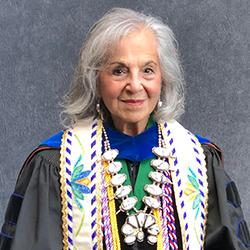
Eloisa Garcia Tamez, RN, PhD, FAAN
Dr. Eloisa Garcia Tamez is a direct descendent of the Native American Lipan Apache, Chiricahua Apache and Basque people of the Lower Rio Grande Valley in Texas. Her people are the Native inhabitants of a region that includes present-day Texas, New Mexico, Colorado and the northern Mexican states of Chihuahua, Nuevo León, Coahuila, and Tamaulipas prior to the 17th century. She was raised in a traditional Indigenous community, on a land grant acknowledged by the King of Spain in 1767. Dr. Tamez is a Professor and former Associate Dean Student Affairs at the University of Texas Rio Grande School of Nursing, College of Health Affairs. She recently earned her fifth degree, a Master’s in Criminal Justice. She is a co-founder of the Lipan Apache Women Defense/Strength to protect sacred sites, burial grounds, archeological resources, ecological biodiversity, and way of life of the Indigenous people of the Lower Rio Grande, North America. Dr. Tamez is a veteran and a former chief nurse executive at various Department of Veterans Affairs Medical Centers and serves on the U.S. Department of Veterans Affairs Advisory Committee on Disability Compensation. This committee is intended to provide advice to the Secretary of Veterans Affairs on establishing and supervising a schedule to conduct periodic reviews of the VA Schedule for Rating Disabilities.

